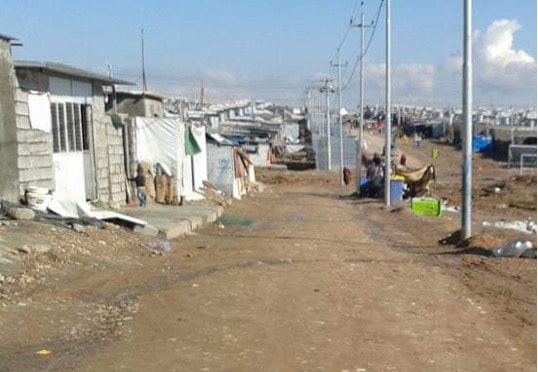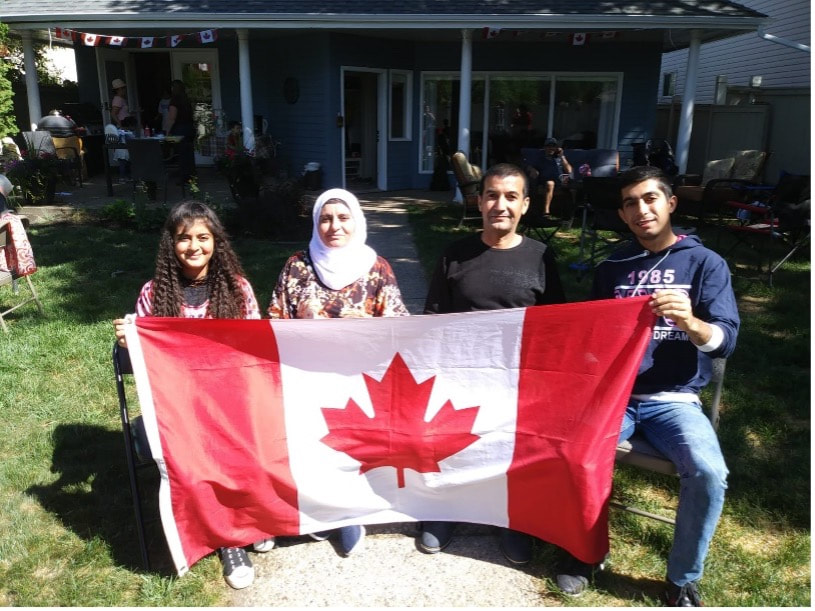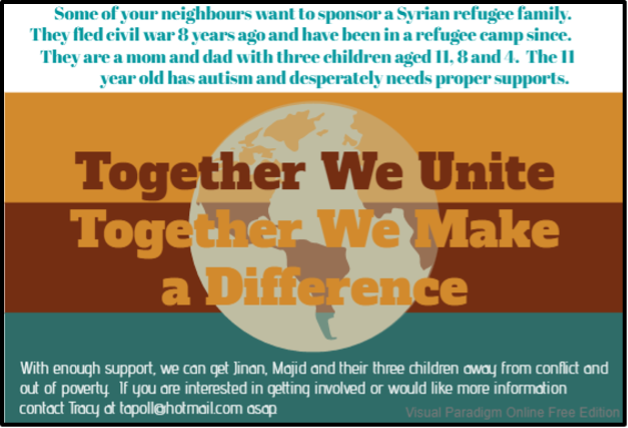Around 2016 a group of Bonnie Doon residents came together in response to the Syrian refugee crisis to sponsor a family. The Marees (pronounced mah-rays; Jamshid, Sharifa, Bahoz, Ahmed, Nafia) were the family we were matched with. The group fundraised for two years and finally, in May 2018, the Marees arrived. Many Bonnie Doon’ers know the Marees and wanted an update on how they are doing. The Association spoke with the Marees recently about their story, how they are doing and the dream for our next potential sponsorship.
An Interview with the Marees
What was it like growing up in Syria?
(Jamshid) I grew up in the province of Al Hasakah in north-east Syria. As Kurds, our people were original settlers in that area, and have been in that province long before the country was formed. I was raised in a small village and remember it being a safe, and happy place. I would ride my bike, climb trees and play football. Later I moved to Keshka, a village with about 120 households and between 1000 and 2000 people. Families were big, you could have 7, up to 10 people per household.
(Sharifa) I grew up in the regional city Al Malekea, which has about 50,000 residents. Childhood memories include playing basketball and football with friends. I finished grade 8, and later met Jamshid through family connections. I moved to Keshka when we married and started a family.
(Jamshid) I farmed land with my 3 brothers where we grew cotton and wheat. We did not want to have too big a family, as it is harder to educate many and the farm did not need too much labour. We only had three children, so as a family of five we were a bit unusual.
A drought hit our region, lasting many years and made it hard to make a living farming. I enrolled in university to be a teacher and studied from the village, taking a bus 12 hours to the school in Damascus twice a month to write tests. This was hard so eventually I moved to the city and started working as a building caretaker, working 16-hour days. We needed the money to survive and so I had to drop out of university. I lived in Damascus for four years, and Sharifa would visit with the kids occasionally. Fighting broke out in Syria and I wanted to be back in the village with my family.
Why did you leave Syria?
(Jamshid) I left Damascus and farmed for another year, but it was difficult. Then ISIS was coming to our province and they were killing Kurds. We did not feel safe and wanted to leave. Iraq, close by, had opened its borders to Syrian refugees and so we went there, to the city of Erbil. My mother was sick and unable to flee. Our second son Bahoz was 16 and not wanting to stop school. He and my brother stayed behind to look after grandma. It was so difficult to leave them behind, especially our 16-year-old son. We were very worried about them. My mother passed after a year and then Bahoz and his uncle were ready to leave, but unfortunately the border had closed by then due to the conflict. We were separated! So, they went the other direction, travelling to Turkey and eventually made it to Germany, so at least we knew they were safe. Bahoz is still in Germany.
Life as a Refugee
What was it like in the refugee camp?
(Jamshid) We settled in one of 6 refugee camps around Erbil called Darashakran, which had maybe 20,000-30,000 people. It was run by the UN. For two years we lived in a tent, the four of us and sometimes visitors. It was hard, so hot in the summer (45-50 degrees), cold in the winter, very windy. Sometimes fires went through. After two years we were given the resources to build our own small shelter – a two room cinder block shelter. At least we got out of the wind and it was a little cooler.
When we arrived each family was receiving $100 for food per month. After 1.5 years that support suddenly stopped, and we had to fend entirely for ourselves. I never got an answer why this was the case. Ahmed and I would go to Erbil for work, day labour at construction sites. I had to stop after 6 months because my back hurt. Ahmed ended up working at a hotel for year. In construction we could make about US$200/month and in the hotel $300/month. Then ISIS came into Erbil and it was no longer safe for Ahmed to work, so he was stuck in camp again. At least the food support program came back for the last year there. Nafia was able to go to school in the camp, which was good. She was 9 years old when we arrived in the camp.
(Jamshid) Years were going by and we were not sure what was going to happen. We would hear about others being selected to go to other countries as refugees, but we had no idea what was going on, and if we could get chosen. Then one day we were notified to come in for an interview. We were hoping for Germany, because Bahoz was there, and I have siblings in Germany and Sharifa has siblings in Austria. We were told we were selected to go to Canada. We were not expecting this.
What did you know about Canada?
Not a lot, except it is a big country, a nice country, democratic and peaceful. And cold! They said Europe wasn’t possible and did we want Canada or not, and we said Yes! We were happy to be chosen for Canada. Once we were ‘matched’ it took a long time for the process to happen. At one point conflict broke out in Iraq and the airport at Erbil was shut down, which delayed it more. Finally, after five years in the refugee camp we set out for Canada.
Settling in Canada
What were your first impressions of Canada when you arrived?
We arrived May 10, 2018 and the day we arrived it was cold. We were worried when we left the airport, how cold it felt – would it be like this all the time? And what about in winter when you add snow? It felt like our winter.
(Sharifa) We were also worried what we would do when we landed, how we would find our way to where we were staying? We were so happy to see a welcoming committee! Tracy, Xander, Bennett, Hassan, Nisrine and a Kurdish lady. It made us very happy that many people cared and were waiting for us.
What was it like to live your first year in Bonnie Doon?
(Jamshid) It was very nice. Many people helped out, set up their apartment, and came by for visits. Karmen, Carol, Mark, Othman, Ghadeer, others, all good people. We remember fondly the first meeting at Tracy’s house, about 25 people gathered around the fire. We had only been there for one day. We also remember the tour of downtown and the river valley with Ghadeer’s boys. Edmonton seemed like a nice city, good for all people. People are helpful we discovered as we would go shopping, take the bus, finding our way, strangers were always helpful.
The best part of being in the neighbourhood was being close to the sponsorship group. We remember walking to the bus stop going to school and actually seeing Les, who waved at us. That felt so good. The hard part in the beginning was the cold – waiting at the bus stop, Nafia walking to Whyte Avenue, so cold! We also had much difficulty with English to start. And no Kurdish people around, although we did meet Wael and Zahor’s family, who are Syrian, and one Kurdish family living by the mall.
(Jamshid) We met Kurdish friends, and there was a group of families living in a small apartment building together. They had a nice community and invited us to join, so when an apartment opened up we moved in. It has been great, we got a larger place for less money. We are happy living there. We also have a car now, so we can drive many places, which makes it easier in the winter. We still take the bus to Norquest for language school and that is good. When we took care of your house for 3 weeks this summer it was nice to be back in Bonnie Doon again. We saw people we knew and like to come back to visit.
When you talk to your siblings in Europe, how do you think life compares here in Canada?
(Jamshid) It seems similar. But in Canada you can apply for citizenship after three years. In Europe it is harder, maybe 7 years.
Your son Bahoz is still in Germany. What has it been like to be apart from him for so long and what are you hoping to do?
(Sharifa) It has now been 8 years since we’ve seen our son. He was 16 when we left him, and now he’s 24. We are very sad and miss him so much. We hope to see him soon. We want him to come here, maybe for a visit, maybe to live. Right now, he’s in an apprenticeship program and working, which he wants to finish. Maybe after he can come.
How is school and work going?
(Jamshid) Language class for Sharifa and I was going well, we are both up to level 4. With Covid, switching to online has been difficult for learning. Now back in person, it’s going well. We are very happy and proud that after 3 years we can do this talk in English. At first it was very hard, but we knew we had to try. Before coming we thought it would be so hard. Especially being older, its hard to learn a language. As a child I learned Kurdish at home and Arabic in grade 1 and was easier then. Nafia is doing well, enjoying school, upgrading grade 12.
(Ahmed) – I finished English level 5, started level 6 and then got a job landscaping. I’m working at Park Landscaping. It feels very good to work and make money. Working here is different. Back home finding a job was through friends, here you need a resume. Work in Iraq was hard, faster pace, longer hours, less money. Here work is comfortable, and better pay. People I work with are friendly. Right now I am doing snow removal when it snows, and am open to other work in the winter if something comes up.
What do you hope to accomplish over the next few years?
(Jamshid) Finish language training, improve English. Nafia wants to study health care (administration, nursing or homecare). Ahmed wants to start his own landscaping company and get married. Sharifa wants to finish language lessons, get a job in childcare and be reunited with Bahoz.
Are you feeling more Canadian as time goes by?
(Jamshid) Yes, we are feeling a little Canadian now. Learning about the many cultures here. As we learn the language, we are having conversations with Canadians and learning more about this country. Ahmed wants to start his own landscaping company so he can help newcomers with work, like he received when he came.
What are your fun memories so far?
(Jamshid) Going to Jasper - Miette hot springs, the townsite and mountains. Staying at Tracy’s parents’ acreage, sitting around the fire and camping. Ahmed and I went to the Canada vs Mexico soccer game, very cold! We danced to stay warm. Surprised they were playing soccer in such cold weather but a good win! Being involved in the Kurdish community here.
Jamshid, your niece and her family are also a refugees in Iraq. What is their situation?
(Jamshid) My niece Jinan, her husband and three children (11,8,3) are in a camp called Qushtapa. They are living in two small room shelter and the husband can work sometimes. They have been in camp a little before we got to Iraq, so they’ve been refugees there now 8 years! There are more refugees than sponsors, and so people wait.
We want her family to come to Edmonton, so we can help her. Life there is very difficult, we know. We will be very happy once they arrive. Their oldest son is autistic, and he cannot get supported in the camp. Cost of medicine he needs is high. They are not receiving any help. We really want to bring them here.
The Next Step for the Refugee Sponsorship Association
Sponsoring Jinan and her Family
The Maree’s niece Jinan, her husband and their three children have been living in a refugee camp for over 8 years. They are living in a two-room cinderblock shelter, their survival dependant on the United Nations food programme and odd labour jobs. Their oldest son is 11 years old and has autism. He is not getting the care he needs. The Maree’s asked if Bonnie Doon can help them sponsor the family to come to Canada.
We have the opportunity to submit the family’s name to the Canadian government as part of Canada’s 2022 commitment, an important start to the long approval process. Once the name is submitted, it can take between 3 and 4 years before the family arrives. Over the next couple of years we will need to raise about $35,000 to support the family. We`ve done it before with the Marees and know we can do it again, but before applying we want to hear from others in Bonnie Doon that they`re behind this initiative.
If you are interested in helping with fundraising, making a donation or helping the family settle in Canada, please let us know. We have to let advise the government before Christmas if we want to kickstart this long process.
For more information or to express your support, please contact Tracy by clicking the button below or writing to [email protected].




 RSS Feed
RSS Feed